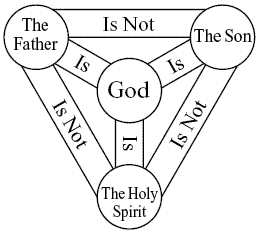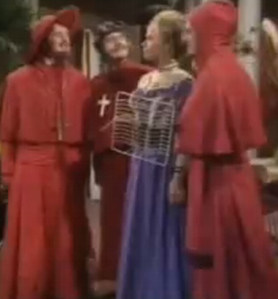Help for James White on Identity
Sincere advice on how to move past a merely verbal defense of “the Trinity.”
Sincere advice on how to move past a merely verbal defense of “the Trinity.”
Gregory of Nazianzus and John of Damascus held that the one God is the Trinity.
Applying the methodology… can we answer the question?
 In round 5, Bowman aims to show that the “threefoldness” of God is implied by the Bible. At issue is how to explain “triadic” mentions of Father, Son, and Spirit (Or God, Jesus, the Holy Spirit, etc.). Bowman mentions his list of fifty such passages. Here he focuses on a dozen passages. But first, his recap of where he thinks the debate is so far:
In round 5, Bowman aims to show that the “threefoldness” of God is implied by the Bible. At issue is how to explain “triadic” mentions of Father, Son, and Spirit (Or God, Jesus, the Holy Spirit, etc.). Bowman mentions his list of fifty such passages. Here he focuses on a dozen passages. But first, his recap of where he thinks the debate is so far:
In the preceding three rounds of this debate, I have argued that the person of Jesus Christ existed as God prior to the creation of the world and that the Holy Spirit is also a divine person. If my argument up to this point has been successful, I have thoroughly refuted the Biblical Unitarian position and established two key elements of the doctrine of the Trinity. Add to these two points the premises that there is only one God who existed before creation and that the Father is not the Son, the Son is not the Holy Spirit, and the Father is not the Holy Spirit, and the only theological position in the marketplace of ideas that is left is the doctrine of the Trinity. Since these are all premises that Biblical Unitarianism accepts, I have not defended them here. (emphases added)
I’m tired of pointing out the inconsistency of what Bowman is urging. I’m capable of hearing the many ways theorists smooth away apparent inconsistencies (making subtle distinctions), but other than a quick gesture (I think in Round 1), I hear none of these familiar notes from him. This is just to say – he’s a resolute positive mysterian. Briefly, Father, Son and Spirit are numerically three, as they qualitatively differ from one another. But also, Bowman seems to think, each of them is numerically the same as God. This is inconsistent, because the “is” of numerical sameness is transitive – if f = g, and g = s, then f = s (compare: the concept of “bigger than”). Also, it seems that he thinks Father and Son to the same god, and also, since this god just is a person (hence “who” above), they are the same person as each other. And, of course, also they are not. Sigh. Let’s stick with the vague “threefoldness” claim I started with.
Bowman ignores what I call Read More »SCORING THE BURKE – BOWMAN DEBATE – ROUND 5 – BOWMAN – PART 1
What, according to Dr. Sanders, is the crisis in contemporary trinitarian systematic theology, when it comes to the Bible?
In this episode, my evaluation of the case made by Shadid Lewis. Does he establish, on grounds which his opponent must affirm, that the Trinity implies polytheism? See Lewis’s arguments as analysed on the post for episode 17. What is the doctrine of the Trinity anyway? Are the persons members of an eternal group of wonderfully unified friends? Or are they aspects or personalities of… Read More »podcast 21 – review of the Lewis-Rogers debate – part 2
In Part 1 I explained how vague it is to say that there are three divine Persons “in” God. In Part 2, I described some different things one might mean by “Persons”. In this third part, I’ll explain some of many things it might mean to say that the three persons are one “substance” (Greek: ousia, Latin: substantia). But before I do that, it is… Read More »“the” Trinity doctrine – Part 3
 Time for the old Spanish Inquisition. Will she survive The (self-administered) Rack?
Time for the old Spanish Inquisition. Will she survive The (self-administered) Rack?
In the final part of her article “Sabellianism Reconsidered”, Baber turns to theological objections. To wit:
Her answers? Jesus, like his contemporaries, was not a trinitarian. That is, he didn’t realize that the God to whom he prayed had temporal parts which were gods. Or even if he did, he didn’t intend to teach any trinitarian doctrine. Thus, he addressed not the Father, but God, as “Father”. (p. 10) Thus the term “Father”, in Jesus’ context, referred to God, while nowadays (post 380 CE?) it refers to the Father, the (temporally) first Person of the Trinity.
In response to the second objection, she notes that “a notion of timeless, metaphysically necessary causationRead More »“Sabellianism Reconsidered” Considered – Part 7 (Dale)
Not all engagement is good engagement.
Last time, we saw the set-up from Leftow. He’s aiming at orthodoxy, which to him means theorizing in the tradition of the great medieval Latin-speaking theologians. He’s spent a good amount of ink defending the consistency of supposing that a person might travel back to the past, so that she, as it were, acts together with (nearby and at the same time as) her earlier… Read More »Leftow 3: “A Latin Trinity” – Part 2
Dr. White vs. John on the thesis of the 4th gospel.
A question from the Facebook group a few weeks ago: …One model of the Trinity that I’ve heard articulated–call it “paterderivationism”–says that the way in which the Father, the Son, and the Spirit are homoousios is the same way in which Caesar, Pompey, and Crassus may be called “homoousios”: they share the same kind of nature, though… not the same instance of that nature. According to… Read More »“paterderivationism,” monotheism, and “mono-theos-ism”
At the end of the gospel according to Matthew, Jesus is portrayed as saying, “All authority in heaven and on earth has been given to me. Go therefore and make disciples of all nations, baptizing them in the name of the Father and of the Son and of the Holy Spirit…”
Dr. Keith Ward is a prolific and influential theologian, philosopher, and scholar of religions. He’s also an Anglican priest. In this first of two interviews on his 2015 book Christ and the Cosmos: A Reformulation of Trinitarian Doctrine, we discuss his christology, how to understand what is unique about the man Jesus.
Here’s a gem of a passage from a little-read paper by Richard Swinburne, from this book. This is part of talk he gave at a 2001 conference in Moscow, Russia, co-sponsored by the Society of Christian Philosophers and the Russian Orthodox church. So he’s explaining the wider context of analytic philosophy to them. Sometimes, when we have to explain things to those outside the camp,… Read More »Swinburne on analytic vs. continental philosophy
Continuing to work through this critique of my post (part 1, part 2) – our friend Annoyed Pinoy writes, Yet, Jesus and the Holy Spirit are repeatedly associated with Yahweh/Jehovah. See, for example, my blog: Identifying Jesus with Yahweh/Jehovah Associated, sure, and in various ways. This is a common equivocation, I find, with theologians. We say “identify with” to mean “associate (in some way) with”.… Read More »On a Rebuttal to my “How Trinity theories conflict with the New Testament” – Part 3
Is this a powerful, state-of-the-art biblical argument for the Trinity?
The rebuttal is to this blog post of mine, and it is by a Blogger user named “Annoyed Pinoy,” with whom I briefly discussed these things in the comments here. I take it that he is an evangelical Christian who is interested in theology – that’s all I know about him, other than that he is a Filipino in Illinois who is smart, curious, and… Read More »On a Rebuttal to my “How Trinity theories conflict with the New Testament” – Part 1
Finally, the last part of this long, five-part series. Our friend Annoyed Pinnoy continues, Now there are varieties of gifts, but the SAME Spirit; and there are varieties of service, but the SAME Lord; and there are varieties of activities, but it is the SAME God who empowers them all in everyone.- 1 Cor. 12:4-6 Notice how Paul uses the word “SAME” three times. Once… Read More »On a Rebuttal to my “How Trinity theories conflict with the New Testament” – Part 5
Dale interviewed on the God-Talk podcast about biblical trinitarian theology and the Bible.